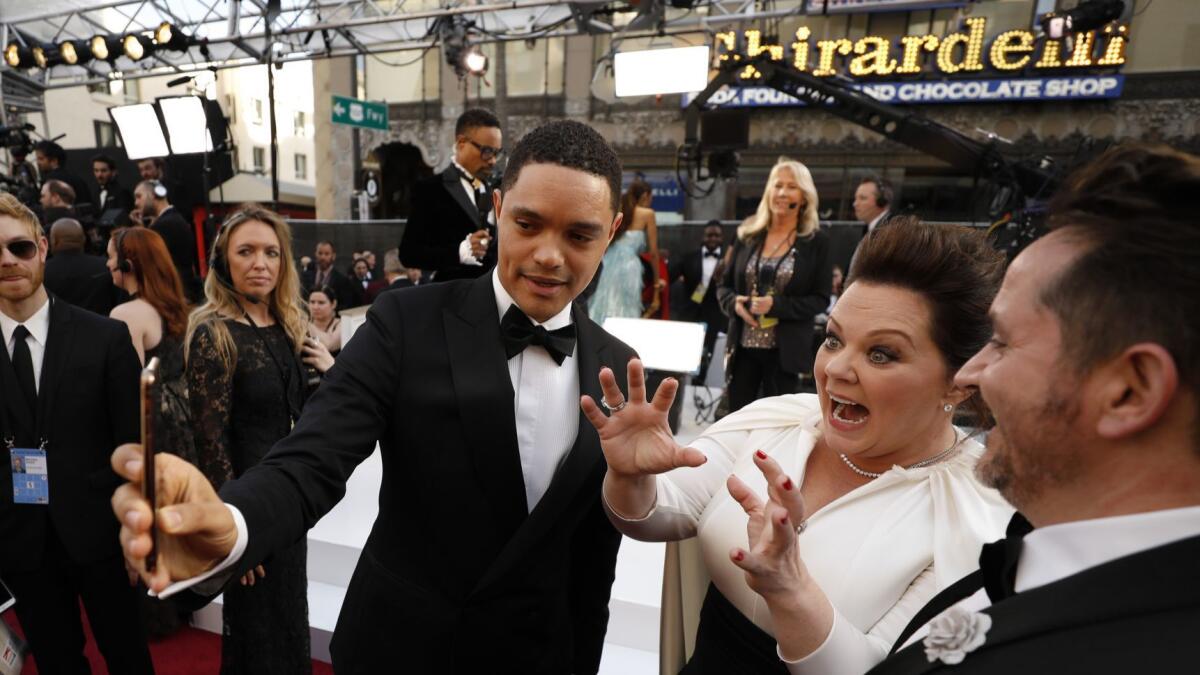AT&T/DirecTV and Viacom continue carriage talks beyond a Friday night deadline

- Share via
In a high-stakes showdown, AT&T Inc. and Viacom Inc. continued negotiations late Friday in an attempt to reach a new carriage deal for Viacom’s networks, including MTV, Comedy Central, VH1, BET and Nickelodeon, on DirecTV and other AT&T television services.
The two companies have been locked in tense talks for days and faced a 9 p.m. PDT Friday deadline. It was not clear late Friday whether the two sides would reach agreement. Short of a deal, AT&T would be forced to pull the Viacom channels from its services DirecTV, U-Verse and WatchTV that together reach 24.5 million customers in the U.S.
Fans have been worried that they might miss Viacom’s programs, including “The Daily Show With Trevor Noah” and “South Park” on Comedy Central; “SpongeBob SquarePants” and “Paw Patrol” on Nickelodeon; and “Love & Hip Hop: Hollywood” on VH1.
Viacom had enlisted several of its top stars, including Noah, Tyler Perry and Lindsay Lohan, to rally fans to pressure AT&T to keep the channels.
“If you think government shutdowns are bad, get ready for something worse,” Noah posted on Twitter.
Perry weighed in on Facebook: “This is crazy. I’ve had DIRECTV for years. You can’t just drop BET!!! And not expect there to be backlash.”
AT&T is the nation’s largest pay-TV provider. In the Los Angeles region, DirecTV is one of the most prominent pay-TV services with about 1 million subscribers.
The dispute comes as both companies struggle to adapt to industry shifts. Streaming services such as Hulu and Netflix have provided consumers with lower-cost alternatives to high-quality television.
Viacom suggested that it was prepared to lower its fees to strike a deal. AT&T currently pays Viacom about $1 billion a year in carriage fees for the channels.
“We’ve made a series of offers that are both good for consumers and good for AT&T,” Viacom Chief Executive Bob Bakish said in a note to staff members earlier in the week. “Despite these efforts, AT&T continues to insist on unreasonable and extreme terms that are totally inconsistent with the market.”
Aside from disagreements over fees, Viacom and AT&T have been tussling over how widely Viacom channels will be available on streaming platforms that compete with DirecTV.
Viacom’s channels aren’t as popular as they once were. And DirecTV has been walloped by customer defections, a problem that has weighed on AT&T’s stock price for much of the last year.
DirecTV lost about 650,000 subscribers in the fourth quarter, underscoring the big challenges facing the El Segundo pay-TV service. AT&T bought DirecTV in 2015 for about $50 billion. Last year, the Dallas telecommunications company paid $85 billion for the parent company of HBO, CNN, TNT and TBS. Now AT&T is choking in debt to the tune of more than $175 billion.
AT&T Chief Executive Randall Stephenson told Wall Street that reducing debt is a priority.
“DirecTV pays Viacom about $1 billion a year. That’s a lot of cash AT&T could use” for paying off debt, Bernstein & Co. media analyst Todd Juenger wrote Thursday in a research report. “How many other low-risk opportunities does AT&T have to save $1 billion in cash?”
Other analysts said dropping Viacom could be catastrophic for DirecTV, which distributes 17 Viacom channels.
“We think AT&T is being a bit irrational,” Marci Ryvicker, media analyst with Wolfe Research Securities, wrote in a report. She noted Viacom channels account for nearly 20% of viewership on the DirecTV service.
The ongoing negotiations at the DirecTV campus in El Segundo suggested that AT&T wasn’t prepared to permanently drop the channels. If there is a blackout, it may be brief, analysts speculated. In 2012, a dispute between Viacom and DirecTV led to a nine-day blackout.
“We are on the side of customer choice and value and want to keep Viacom’s channels in our customers’ lineups,” AT&T said in a statement. “The facts speak for themselves: Several of Viacom’s channels are no longer popular. Viacom’s channels in total have lost about 40% of their audience in the past six years.”
Viacom’s weakness in such contract negotiations is one reason why its controlling shareholder, Shari Redstone, wants to combine the company with CBS Corp. Pay-TV operators would be unlikely to drop the channels if they were packaged with CBS — one of the most popular networks in television.
Twitter: @MegJamesLAT
More to Read
Inside the business of entertainment
The Wide Shot brings you news, analysis and insights on everything from streaming wars to production — and what it all means for the future.
You may occasionally receive promotional content from the Los Angeles Times.











